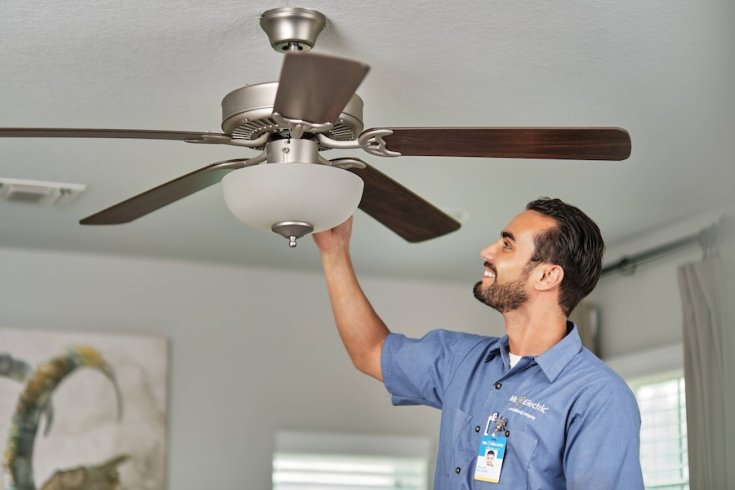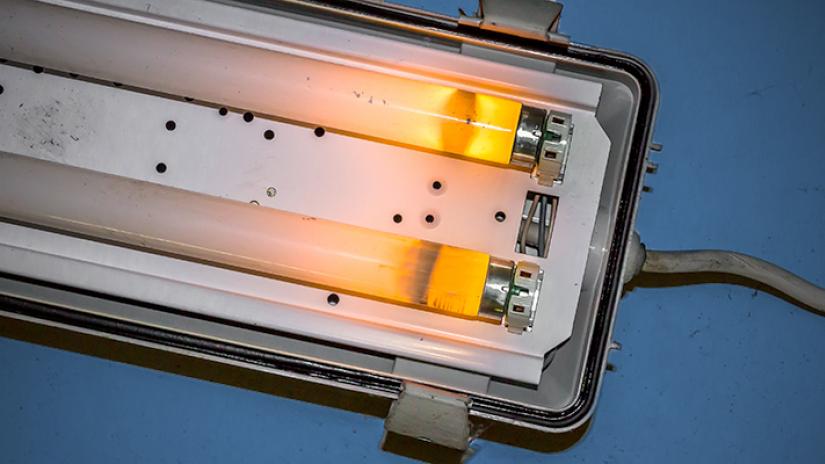
24-Hour Emergency Electricians in Fort Worth, TX
Call this Thursday to Get 10% OFF
Need an electrician?
Schedule NowRequest Electrical Service Now
817-585-299324-Hour Emergency Electricians in Fort Worth, TX
Call this Thursday to Get 10% OFF
Need an electrician?
Schedule NowRequest Electrical Service Now
817-585-2993
Replacing a fluorescent light ballast is a big job, and the whole project may take anywhere from one to four hours. A large part of this time is taken up by removing the components from the ceiling, pulling out the old ballast, and reinstalling the new ballast. With Mr. Electric's educational information below, you'll understand the full process of what is involved with replacing a fluorescent light ballast.
Fluorescent light fixtures are an efficient means of lighting up a large area. While the ballasts don't go bad often, they can be a hassle to replace. The fluorescent light ballast is hidden from view, so finding it can be difficult. It's also important to take safety precautions before working on any electrical device.
Follow these steps to replace your fluorescent light ballast:
Tools
Phillips screwdriver
Shut Off Power
Always shut off power at your electrical panel before working with the wiring. If you are uncertain about which breaker controls the circuit, use a non-contact voltage tester to verify that there is no power running to the fixture. You can then proceed with replacing the ballast.
Remove Fixture Cover
Use your Phillips screwdriver to remove the screws holding on the cover. Be careful not to drop the cover when removing it -- you may have broken glass inside. If so, proceed slowly and clean up any shards as you go along.
Remove Fluorescent Light Tubes
First, remove the bulbs from the light and then unplug them from the junction box or turn off the power at the breaker or fuse box for your lighting replacement.
Remove Cover Plate
Next, remove the cover plate from the fixture by unscrewing it with a screwdriver.
Check Voltage Use
a non-contact voltage tester to check for voltage in each wire connected to the existing ballast before proceeding. If there's any voltage present, stop and call an electrician for help.
Take a Photo Of the Wires
Take a digital photo of the wiring before disconnecting any wires so you can use it as a reference when replacing your ballast.
Disconnect Ballast Wires
Disconnect each wire connected to the ballast using needlenose pliers.
Remove Ballast Loosen
the screws on the electrical components to remove them from their slots. There may be more than one ballast in your fixture, so repeat this for each. Once all of them are removed, no electrical components remain within the fixture.
Prepare Wires For New Ballast
Your old ballast may have been held with tape or wire nuts. Remove these components and dispose of them properly once they are no longer attached to anything else. The wires should be clearly labeled as hot and neutral wires, but you can consult a certified electrician at Mr. Electric if they aren't.
Install New Ballast
Reinstall mounting screws, being careful not to over-tighten them not to crack the fixture's plastic housing. According to the wiring diagram (usually color-coded), reconnect wires, then snap ends onto corresponding wire terminals on the new ballast.
Reinstall Light Components
Use the same procedure to reinstall your light fixture components, but be careful not to bend the tube.
Restore Power
Make sure your wires are clear of the fluorescent light ballast and turn the power on. If your new ballast works properly, you will see a bright glow from your lights.
Dispose of Old Ballast Properly
Fluorescent light ballasts contain PCBs, which are toxic. Check with your local waste management department to find out how to properly dispose of your old ballast.
Fluorescent light ballasts are essential for providing power to fluorescent tubes and are used to control the electric current that is sent through a fluorescent tube. Fluorescent light ballasts can fail over time and result in flickering lights or no lights. Since each has unique wiring, take photos before attempting repairs.
Contact Mr. Electric when you have questions regarding all your electrical needs.